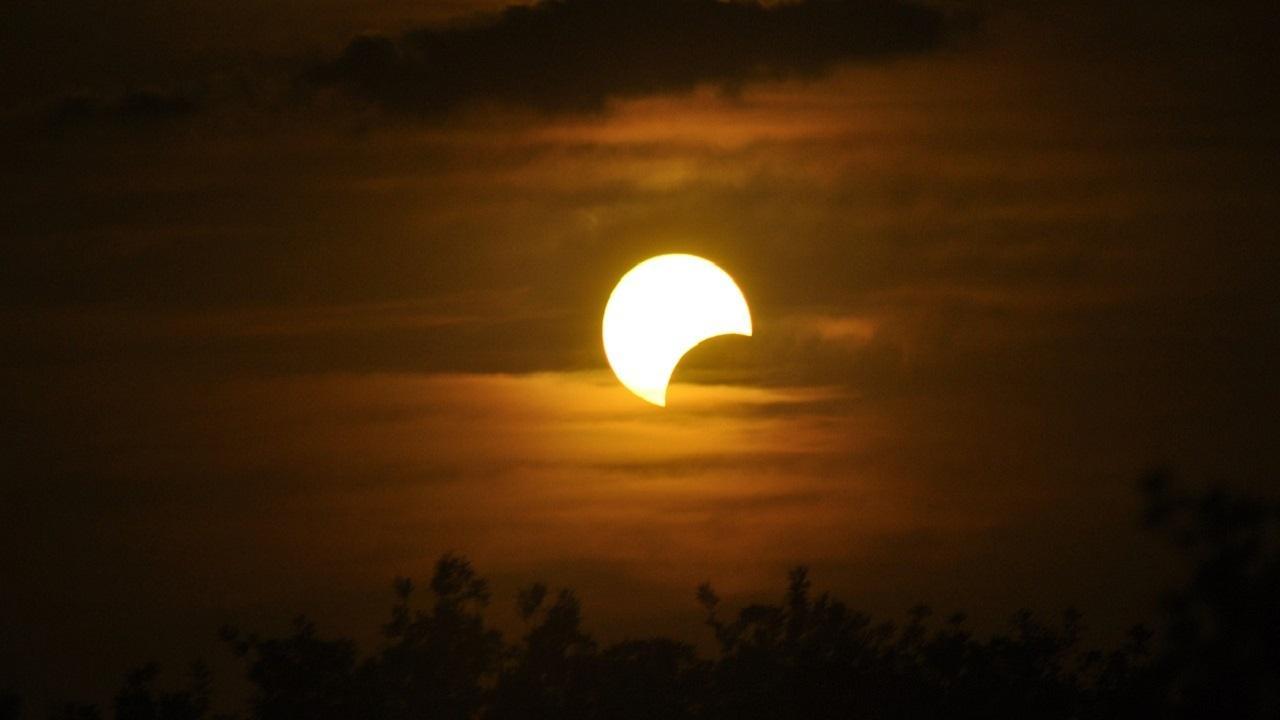A total solar eclipse is expected to take place on April 8 and people are waiting with bated breath to experience the astronomical beauty

Representational Image. Pic/Pixabay
Every so often, the universe treats us to a breathtaking celestial phenomenon that captures the imagination of people around the world—the solar eclipse. This extraordinary event occurs when the moon passes between the Earth and the sun, casting a shadow on our planet and momentarily dimming the sunlight. While solar eclipses have fascinated humanity for millennia, the science behind these occurrences continues to intrigue and inspire.
A total solar eclipse is expected to take place on April 8 and people are waiting with bated breath to experience the astronomical beauty.
Solar eclipse 2024: The Mechanics of a Solar Eclipse
At its core, a solar eclipse is a dance of celestial bodies—an intricate alignment of the sun, the moon, and the Earth. From our vantage point on Earth, we witness this phenomenon as the moon obscures the sun, either partially or completely, creating a mesmerizing display in the sky.
There are three main types of solar eclipses: total, partial, and annular.
Total Solar Eclipse: This is perhaps the most awe-inspiring type of solar eclipse. During a total solar eclipse, the moon completely covers the sun, plunging the area within the moon's shadow, known as the umbra, into darkness. The sky darkens, stars become visible, and the sun's corona—an aura of plasma surrounding the sun—glows brightly around the edges of the moon. Total solar eclipses are rare and can only be observed from specific regions on Earth.
Partial Solar Eclipse: In a partial solar eclipse, the moon only partially covers the sun, creating a crescent shape of sunlight. This type of eclipse is more common and can be seen from a wider geographic area than a total eclipse.
Annular Solar Eclipse: An annular eclipse occurs when the moon is too far away from the Earth to completely cover the sun's disk. As a result, a ring of sunlight remains visible around the edges of the moon, creating what is often referred to as a "ring of fire" in the sky.
Solar eclipse 2024: The Dance of Celestial Bodies
The occurrence of a solar eclipse relies on the precise alignment of the sun, moon, and Earth—a celestial choreography that occurs with remarkable regularity. The moon orbits the Earth in an elliptical path, while the Earth orbits the sun. However, the moon's orbit is inclined relative to the Earth's orbit around the sun, which means that solar eclipses do not happen every month.
Solar eclipses typically occur two to four times a year, but not every eclipse is visible from all parts of the Earth. The path of totality—the narrow strip of land where a total solar eclipse is visible—varies with each eclipse, tracing a trajectory across the Earth's surface. Astronomers use sophisticated models and calculations to predict the path of totality and determine where the best viewing opportunities will be.
Solar eclipse 2024: The Cultural Significance of Solar Eclipses
Throughout history, solar eclipses have captivated cultures and civilizations around the world. Ancient civilizations often interpreted eclipses as omens or portents, associating them with significant events or changes in society. In some cultures, rituals and ceremonies were performed during eclipses to ward off evil spirits or encourage the return of the sun.
Today, solar eclipses remain a source of wonder and inspiration for people of all ages. Amateur astronomers and professional scientists alike eagerly await these rare events, using them as opportunities to study the sun, the moon, and the Earth's atmosphere. Eclipse chasers travel the globe to witness total solar eclipses firsthand, often describing the experience as transformative and profound.
Solar eclipse 2024: Safety Precautions for Viewing Solar Eclipses
While solar eclipses are undeniably mesmerizing, it's essential to observe them safely to protect your eyes from damage. Looking directly at the sun, even during an eclipse, can cause permanent eye damage or blindness. Specialized solar filters, such as eclipse glasses or handheld viewers, are necessary for safe viewing. These filters block harmful ultraviolet and infrared radiation, allowing you to observe the eclipse without risking eye injury.
Alternatively, you can use indirect viewing methods, such as pinhole projectors or solar viewing cards, to safely observe the eclipse without looking directly at the sun. Remember, your eyes are precious—take the necessary precautions to enjoy the beauty of the solar eclipse safely.
Solar eclipse 2024: Conclusion
Solar eclipses are awe-inspiring reminders of the majesty and complexity of the universe. From the precise alignment of celestial bodies to the cultural significance imbued by civilizations throughout history, these events continue to captivate and inspire people around the world. Whether you're an amateur astronomer, a seasoned eclipse chaser, or simply a curious observer, witnessing a solar eclipse is an experience unlike any other—one that leaves an indelible impression on the soul and sparks a lifelong fascination with the wonders of the cosmos.
 Subscribe today by clicking the link and stay updated with the latest news!" Click here!
Subscribe today by clicking the link and stay updated with the latest news!" Click here!










